Coordinación
Una coordinación sólida puede evitar vacíos y duplicaciones en las respuestas humanitarias, así como garantizar que los PTM complementen otros tipos de asistencia. Sin embargo, el informe del «Estado Global de los Programas de Transferencias Monetarias» de la CALP Network muestra que la coordinación de la asistencia en efectivo es vista como débil y ad hoc, y que esto está teniendo graves repercusiones operativas.
Los donantes, las ONG y los líderes de los grupos de trabajo de transferencias monetarias (GTM) han pedido claridad sobre tres temas principales relacionados con la coordinación de la asistencia en efectivo:
- Quién debe ser responsable de asegurar una coordinación eficaz de la asistencia en efectivo;
- Cuál es la función y el mandato de los grupos de trabajo de transferencias monetarias, incluso en relación con las transferencias monetarias multipropósito;
- Cómo se debe dotar de recursos a la coordinación de asistencia en efectivo.
Tenemos que basarnos urgentemente en lo que funciona y proporcionar claridad a nivel mundial sobre las preguntas arriba mencionadas, adaptándonos a los diferentes contextos. Hace mucho tiempo que se deberían haber tomado decisiones claras basadas en necesidades operativas y no en la política de las agencias.
Prioridades actuales
El objetivo de la CALP Network es contribuir a seguir progresando en este tema en tres niveles: apoyar a los grupos de trabajo de transferencias monetarias a nivel regional; contribuir a soluciones prácticas para la coordinación de la asistencia en efectivo a nivel mundial; y convocar una discusión basada en la evidencia sobre temas clave, destacando puntos de decisión críticos y oportunidades de progreso.
Contenido destacado

Cash Coordination Tip Sheet
Guidelines and Tools
This tip sheet sets out established best practice, key guidance and resources for all aspects of cash coordination, intended as a clear, accessible and action-oriented guide for those engaged in coordination of cash and voucher assistance (CVA) at the field level.

Introducing the Cash Coordination Tip Sheet
Webinar
The CALP Network has developed a tipsheet setting out established best practice and key guidance and resources for all aspects of cash coordination, intended as a clear, accessible and action-oriented guide for those engaged in coordination of cash and voucher assistance at the field level.

Cash Coordination: A proposal from members in MENA
Blog Post
Earlier this year the CALP Network undertook regional consultations to explore options for cash coordination. This blog lays out recommendations from participants from the Middle East and North Africa who sketched out what cash coordination, and coordination more broadly, could look like in future to support a more effective, efficient and accountable response.
Últimos recursos
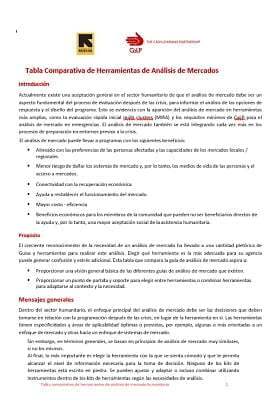
Tabla Comparativa de Herramientas de Análisis de Mercados
Guía y herramientas
El creciente reconocimiento de la necesidad de un análisis de mercado ha llevado a una cantidad pletórica de Guías y herramientas para realizar este análisis. Elegir qué herramienta es la más adecuada para su agencia puede generar confusión y estrés adicional. Esta tabla que compara la guía de...
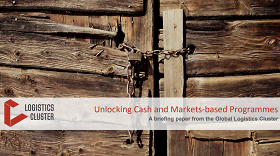
Unlocking Cash and Markets-Based Programmes
Report
In the aftermath of an emergency, humanitarian agencies are increasingly recognising the value of cash and voucher modalities, and market engagement. For Logistics and Supply Chain, our roles are evolving to embrace this trend, adapting our ways of working and even take on new responsibilities. Many...

Philippines Haiyan Response – A multi-sectoral review of the use of market analysis and the design and implementation of CTPs
Report
Following Typhoon Haiyan, which hit the Philippines on November 8 2014, at least 45 aid agencies chose to implement Cash Transfer Programming (CTP) to assist the more than 16 million people affected. Cash transfers were a logical approach in a country with developed market systems, strong financial...
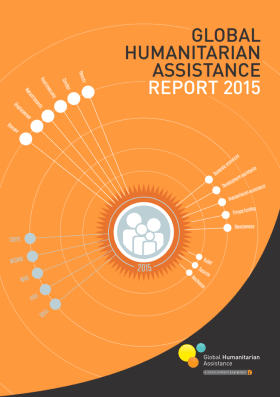
Global Humanitarian Assistance Report 2015
Report
Humanitarian financing is in the spotlight like never before. An extraordinary combination of crises continues to test international, national and local capacity to prevent, prepare and respond as needs continue to outstrip available resources. Global processes taking place during 2015 and 2016 –...

Financial Services Primer for Humanitarians
Guidelines and Tools
Financial services facilitate a wide range of economic and households activities in any society. They enable trade and business expansion and allow individuals to save, send and borrow money. Humanitarian cash transfers, particularly when delivered electronically,can expand access to financial services...

Cost-Effectiveness Analysis of Cash-Based Food Assistance Projects: A case study and discussion paper of findings in Niger
Report
Despite recent and expanding literature on cost effectiveness and value for money, there is little by way of guidance for the implementation of cost-effectiveness analysis in humanitarian and development programming. This report distills findings from the literature on ex post cost-effectiveness analysis,...

Protection Risks and Benefits Analysis Tool
Report
This tool provides global evidence on the protection risks and benefits of cash-based interventions, divided into key protection areas. It outlines the key questions that practitioners should explore to reach a context-specific, participatory identification of protection risks and benefits of a given...

Livelihoods Toolbox
Guidelines and Tools
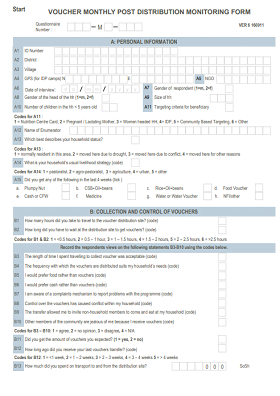
Voucher Monthly Post Distribution Form
Report
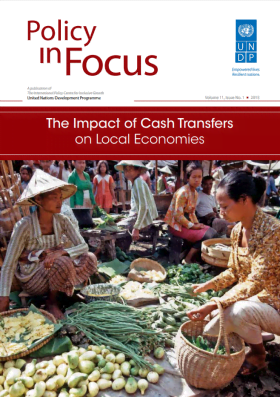
The Impact of Cash Transfers on Local Economies
Policy paper
In this special edition of Policy in Focus, leading authors and practitioners present their research on how cash transfers can impact the local economy when implemented in a developing country. The aim is to gather and review research results and evidence, obtained from various methodologies ranging from...
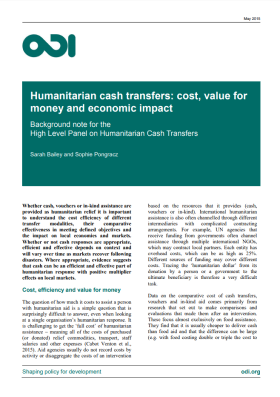
Humanitarian Cash Transfers: Cost, value for money and economic impact
Policy paper
The question of how much it costs to assist a person with humanitarian aid is a simple question that is surprisingly difficult to answer, even when looking at a single organisation’s humanitarian response. It is challenging to get the ‘full cost’ of humanitarian assistance – meaning all of the...

Notas de orientación sobre transferencias monetarias y medios de vida- Africa Occidental
Guía y herramientas
A raíz de los debates sobre el papel de las transferencias monetarias en el fortalecimiento de la resiliencia, la creciente aceptación de las transferencias en efectivo como herramienta intersectorial se ha visto acompañada de una mejor comprensión de este enfoque y de su potencial para romper el...
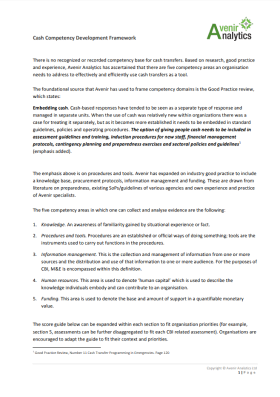
Cash Competency Development Framework
Guidelines and Tools
There is no recognized or recorded competency base for cash transfers. Based on research, good practice and experience, Avenir Analytics has ascertained that there are five competency areas as an organisation needs to address to effectively and efficiently use cash transfers as a tool.
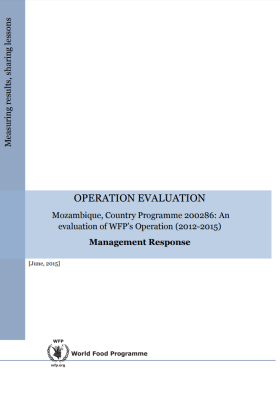
Mozambique, Country Programme 200286: An evaluation of WFP’s operation (2012-2015) – Management Response
Report
The final evaluation covers WFP’s country programme (CP) 200286 (2012-2015). It was intended for both accountability and learning purposes and focuses on assessing: the appropriateness and coherence of the operation its results the factors explaining the results. The evaluation assessed the...

Cash in Emergencies Toolkit
Guidelines and Tools
Access Toolkit Here Cash transfer based programming (CTP) is an effective and flexible way to support people affected by emergencies, maintaining their dignity and choice, while fostering local economies. CTP includes all forms of cash and voucher-based assistance. The Cash in Emergencies Toolkit has been...

Tips for Protection in Cash based interventions
Guidelines and Tools
This document presents a set of general tips to identify, monitor and mitigate protection risks and maximize protection benefits of cash-based interventions.
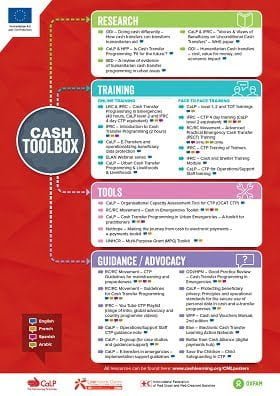
Cash Toolbox
Guidelines and Tools
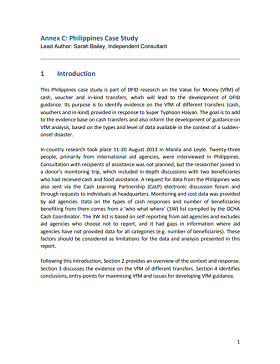
Annex C: Philippines Case Study
Report
This Philippines case study is part of DFID research on the Value for Money (VfM) of cash, voucher and in-kind transfers, which will lead to the development of DFID guidance. Its purpose is to identify evidence on the VfM of different transfers (cash, vouchers and in-kind) provided in response to Super...
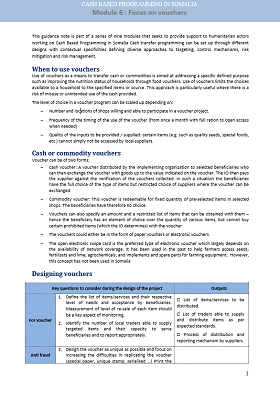
Cash Based Programming In Somalia – Module 6: Focus On Vouchers
Report
This guidance note is part of a series of nine modules that seeks to provide support to humanitarian actors working on Cash Based Programming in Somalia Cash transfer programming can be set up through different designs with contextual specificities defining diverse approaches to targeting, control...
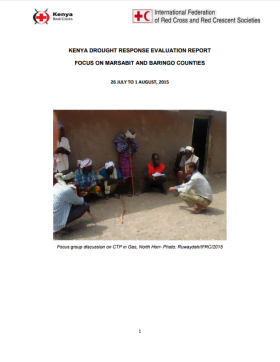
Kenya Drought Response Evaluation Report – Focus on Marsabit and Baringo Counties
Case Study
An evaluation of a drought response which involved school feeding, cash transfers and nutrition outreach activities.